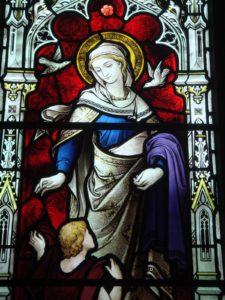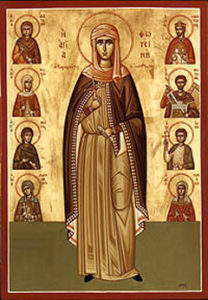In yesterday's matchup between the Golden Mouthed John Chrysostom and the Harp of the Holy Spirit Ephrem of Nisibis, the bishop plucked the deacon 74% to 26% to advance to the Elate Eight.
Today, we're back up to the Biblical quadrant of the bracket as Tabitha takes on Photini. The winner of this battle will meet Martha of Bethany in what promises to be a bruising Elate Eight pairing.
Yesterday, we also celebrated the release of Tim's new book on coffee and faith, titled Holy Grounds: The Surprising Connection between Coffee and Faith - From Dancing Goats to Satan's Drink. It makes a terrific gift for everyone on your Lent list! And, yes, even tea drinkers will find it a compelling read.
Tabitha
 Tabitha is a saint who has inspired apostles to put words into action and poets to put her actions into words.
Tabitha is a saint who has inspired apostles to put words into action and poets to put her actions into words.
In his poem by the saint’s Greek name, “Dorcas,” George MacDonald guesses the saint may have heard Jesus speak. After all, as others have noted, the Bible describes her as a disciple.
Maybe she heard Jesus tell the parable of the sheep and goats: “Truly I tell you, whatever you did for one of the least of these brothers and sisters of mine, you did for me.” Maybe that’s what inspired her to the action for which she is remembered: making robes and other clothing to help the poor and widows at Joppa. Maybe she clothed them, or maybe she sold the clothing to help support them.
MacDonald closes his poem, imagining Tabitha’s life and death:
“Home, home she went, and plied the loom,
And Jesus' poor arrayed.
She died-they wept about the room,
And showed the coats she made.”
In another poem — “The Widows' Tears; Or, Dirge Of Dorcas”— Robert Herrick gives words to the widows gathered around Tabitha’s body, crying and showing off the clothing she had made. In Herrick’s words, they address the saint:
“Sleep with thy beauties here, while we
Will shew these garments made by thee;
These were the coats; in these are read
The monuments of Dorcas dead:
These were thy acts, and thou shalt have
These hung as honours o'er thy grave.”
This is what brought Peter to Joppa — now Tel Aviv-Jaffa — after the disciples there sent several men to urge him to come and heal Tabitha. It’s also what led to a breakthrough for Jesus’ early followers, throwing open the doors of the church to welcome all, Jewish or Gentile. While in Joppa, Peter stayed with Simon the tanner, whose work would have left him smelly and often ceremonially unclean according to Jewish law. And Peter had a vision at Simon’s house in which God told him not to call anything impure that God had made clean.
He then immediately had the opportunity to put what he heard into action when several men asked him to come to the home of a centurion named Cornelius, who also had a vision. This meant associating with and visiting a Gentile, which, he told them, is against Jewish law. And yet Peter went. Maybe he was inspired by Tabitha to put words into action.
Later “Dorcas societies” were. They formed to provide clothing for the poor.
And who knows who else she continues to inspire, as she is remembered with feast days in a number of Christian traditions, depicted in stained glass windows in all kinds of churches and considered by the Orthodox Church in America to be the patron saint of tailors and seamstresses.
Photini
 Photini (one of many spellings of her name) encounters Jesus at the well as she is drawing water and he comes for a drink. She engages him in conversation, a testament to the boldness that would define her life as an apostle and missionary and her words that proclaimed fearlessly the Good News in Jesus.
Photini (one of many spellings of her name) encounters Jesus at the well as she is drawing water and he comes for a drink. She engages him in conversation, a testament to the boldness that would define her life as an apostle and missionary and her words that proclaimed fearlessly the Good News in Jesus.
Her words converted her own family. On Pentecost, Photini, her five sisters, and two sons were baptized. She continued her missionary career, going to Carthage to preach the Good News of Jesus, then to Rome. Photini boldly proclaimed to Nero, when asked why she was in Rome, “We have come to teach you to believe in Christ.”
Nero asked if she was prepared to die for this man she called Christ, to which Photini, never one to be a silent witness, proclaimed to all the Roman court, “Yes, for the love of Jesus, we rejoice in his name and will gladly die for him.”
Nero tried to martyr Photini and her companions, to which she responded repeatedly with words of prayer and praise for Jesus. Nero beat them, and Photini sang psalms. He ordered his sister to have a banquet for them, hoping to tempt them with wealth and luxury. Photini’s witness converted Nero’s sister, who ordered all the gold from the banquet distributed to the poor citizens of Rome. Nero ordered them burned for seven days in a furnace. Photini sang hymns, until they walked out of the furnace, still singing hymns. Nero ordered them to drink poison. Photini offered to be first, saying, “I will drink first so you will see the power of God.” They all survived.
For three years, Nero imprisoned Photini. While she was imprisoned, she turned her jail cell into a church as she preached and baptized, converting many Romans. Nero eventually threw Photini into a dry well, where she welcomed embrace of the Living Water into eternal life.
In the 11th century, an epidemic causing blindness swept through Constantinople. A man named Abraamios, wept and called out for help from his failing sight. One night he saw an elderly woman, holding a candle that cast away all shadows from his dimming vision. She said to him, “Receive the light.” She directed him to a cave. Abraamios immediately ran to the place, where he found an underground chamber holding the bones of Photini. Abraamios kissed her bones and wept, and he regained his sight.
The witness of Photini continues to preach to us. The church built at the Well of Jacob near modern-day Nablus is filled with icons telling the story of her encounter with Jesus. And the Monastery on Mount Athos houses her incorrupt foot and leg, while Grigoriou Monastery has a portion of her skull. Her relics and icons are venerated daily in thanksgiving for her words and her life that led many to believe in Jesus.
[poll id="259"]
86 comments on “Tabitha vs. Photini”
I have been advocating for Ananias of Damascus literally for years, so there's no way I'm going to vote for Photini who knocked him out of the first round. However, even if my mind had not already been made up, the opening sentence of today's writings would have won me: Tabitha is a saint who has inspired apostles to put words into action and poets to put her actions into words. Well done, Emily.
This is a hard one, Missionary or Evangelist. The church needs both and can't survive without each of them. Need to think so more.
Photini for having the faith to believe that even Nero could be converted.
Yes, that is deep faith indeed.
The story of Photini seems like a fictionalized image of Christian virtue - albeit a good story. There was a Samaritan woman at the well - but Photini is a later character - given a name, and martyrdom - and merged with the woman at the well for greater effect. I vote for Tabitha/Dorcas who quietly did what needed to be done, and was acknowledged early on.
The only reason I could think of for not voting for
Photini is that she will make it harder for Martha of Bethany to win the Halo!
Tabitha is so deacon-like, that I endorse her for the Halo. (I am sure she would sell it and use the proceeds to serve the poor.)
Tabitha is like many Xns I know: working diligently to do their small part in answering the tangible work of clothing the poor...we have a kit if these unsung heroines (and heros) who work quietly but steadfastly at doing good works
Interestingly, I have met a lot of Dorcas who also focus on the poor at rummage sales and repairing altar clothes and vestments for the church,
I voted for the woman at the well. It's a pity that so much of her story reads like mythology; however, many more famous saints are also loaded down with fabulous post-gospel tales. Setting all that aside, the woman at the well--the first to know Jesus as Messiah--is my vote for the Golden Halo.
Photini, the woman at the well, is significant to me because she was a Samaritan. Samaritans were the untouchables of their day, and Jesus broke the barrier by asking for water. Photini stepped through the barrier to convert others.
Tough choice again today. Tabitha is truly a saint in her care of widows and the poor and she is a valued example of living out the teachings of Jesus. But the woman at the well will always get my vote (and, I hope, the Golden Halo!).
Photini 's story is just a bit much. Tabitha is my choice.
Tabitha/Dorcas in memory of my mother and grandmother who faithfully did sewing, knitting and mending for the poor and elderly in our small town. And, I consider her the patron saint of prayer shawl knitters!
My ancestors were tailors/ seamstresses; the trade they were in provided them with safe passage from the Kaiser's army. My mother did much 'charity sewing/quilting' and I carry on her spirit of 'hands to work/hearts to God' service in a parish sewing ministry. Guess who I voted for?!
Photini for the Golden Halo! I love her story. Such a strong witness for The Way. Great write up, Laurie.
I taught in the senior school at Tabeetha School in Jaffa for four years - no way i can vote for anyone else.
I think Photini will do better against Martha. It'll be difficult for any of these women to beat Ignatius unless women just vote for their gender. The vast number of non-replying voters is interesting and we have no way to guess anything about their denominations, but I don't think the majority of them are Episcopalians. And yes, I think that has a major effect on the winners.
Photoni. You can't keep a good woman down. Nero couldn't kill her. So how can anyone vote against her?
I have been a Dorcas/Tabitha fan since high school, so my vote today goes to her.
My vote goes to Tabitha today.
Tabitha for me today- She may be the underdog but I was very struck by the comment on how she went about quietly doing what needed to be done and thought how gentle she also must have been and how absolutely centered in on Christ she must have been in her daily life, whether it was in thought, word, or actions.
How lovely for Tabitha to have inspired poetry which almost won my vote, but I have to stick with Photini because I find the story of her encounter with Jesus so moving.